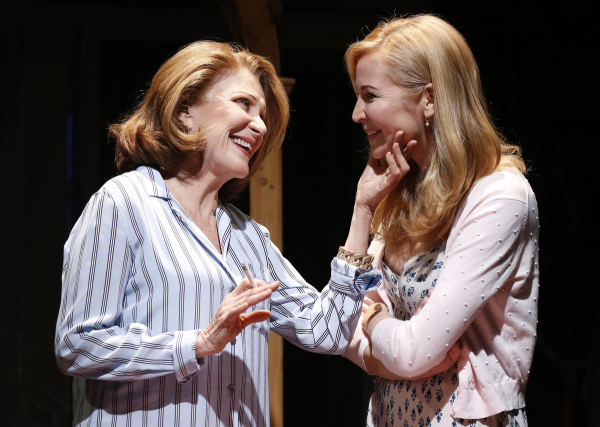Too Much Sun

(© Carol Rosegg)
A grand dame of the stage stands front and center in a generically "Eastern" sheer red dress covered in what appears to be the CBS logo. This is Medea, the sorceress from a Greek myth who sacrifices her children in a jealous rage to spite her husband. Well, actually it's just Linda Lavin playing Audrey Langham playing Medea in a terrible Chicago production of the millennia-old tragedy by Euripides. Before storming out of this disastrous technical rehearsal, she screams at her director, "Who wants to sit through Medea anyway?!"
Apparently, a lot of people. Passionate love, with all its ensuing jealousy, rage, and cruelty, still has as much currency in our society as it did in the age of Euripides. Playwright Nicky Silver thinks it's a dangerous obsession, and he will let you know as much in his hilarious and heartbreaking (but not particularly original) new play, Too Much Sun, now receiving its world premiere at the Vineyard Theatre.
Too Much Sun reunites Silver with director Mark Brokaw and leading lady Lavin, the same team behind Silver's 2012 Broadway transfer from the Vineyard, The Lyons. Cosmetic similarities to that earlier title abound: Too Much Sun features not one, but two dysfunctional families; there's at least one obligatory gay character; and the whole ensemble is presided over by a sharp-tongued and endearingly callous matriarch. You may get the feeling that you've seen this play before.
Audrey Langham (Lavin) spent decades playing great stage roles and marrying less-than-great men, much to the chagrin of her perpetually tense daughter, Kitty (Jennifer Westfeldt). After walking out on Medea, Audrey takes refuge in the Cape Cod summer home Kitty shares with her husband, Dennis (Ken Barnett). (Donyale Werle's set, festooned with sand fences and dingy gray shingles, immediately places us in the New England beach resort before the actors ever have to tell us.) Ever the serial matrimonialist, Audrey immediately sets her sights on their wealthy and unbearably Waspy neighbor, Winston (Richard Bekins). Meanwhile, Winston's pot-dealing son, Lucas (Matt Dickson), has his own agenda in the love department. The whole situation takes on a dire financial urgency when Gil (Matt Dellapina), an assistant of Audrey's agent, arrives to retrieve her back to Chicago to salvage the production.
As Kitty, Westfeldt carries a world of stress on her constantly elevated shoulders. A school teacher obviously used to enforcing a strict dress code, she covers them up with cutesy pastel shrugs, as if this will mask her pervasive anger (nuanced and authentic costume design by Michael Krass). She's a ticking time bomb ready to explode and shower her alleged loved ones with shrapnel.
In sharp contrast, Dickson's Lucas is a habitually relaxed and perpetually stoned gay man-child. His Muppet-like cheer masks a deep and unresolved hurt, however, that Dickson unleashes with a torrent of anger, like a trapped animal fighting for its life.
Lavin is characteristically blasé in her quick wit and ability to humiliate her daughter. Every moment is controlled and never overdone. "Leave her alone," she commands Denis as he attempts to chase after his wife following an outburst of rage. Lavin exudes a quiet power that lets everyone in the room know she means business. That is how you do mom voice.
Under Brokaw's steady direction, this solid ensemble registers powerful performances. Unfortunately, the script offers little in the way of surprise and suspense. All of the illicit couplings in this play are incredibly predictable, the strange plot twists not nearly so bizarre. The show floats along on Silver's considerable wit and the cast's ability to deliver it with flawless timing.
A second-act monologue in which Winston (elegantly spoken by Bekins) articulates his distaste for love (the kind Medea had for Jason) pretty much sums up Silver's take on the matter in Too Much Sun. Should this irrational emotion that drives people to drink and hurt and kill really be as idealized as it is? This is where the writing is at its freshest and most thought-provoking. Of course, considering that we've arrived at this challenging moment after two hours of affected drama, it's a little hard to accept its truthfulness.










